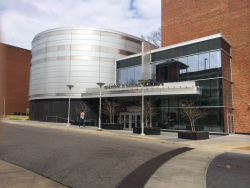 The FedEx Institute of Technology building.
The FedEx Institute of Technology building. The city of Memphis has international acclaim for a few different reasons. Homebase of both the blues and FedEx, the town is known as a cultural and delivery hotspot. Medical research at St. Jude brings people in need across the world to benefit from the Bluff City.
But one of the most well known things about Memphis that still evades local importance is the research being done at the University of Memphis' FedEx Institute of Technology, according to the Center for the Study of Adult Literacy Program Coordinator, Whitney Bare.
| Artificial intelligence has become a hot topic as of late, even having Bill Gates remark on the likelihood of a robot workforce. |
"Auto Tutor is a program that attempts to model a person's tutoring strategies in an effort to adapt to a student or learners learning style," said former research assistant John Myers. "It's purpose is to produce the most robust tutoring system."
Auto Tutor attempts to use artificial natural speech to better convey information to a learning person who is currently in a testing phase. What the Auto Tutor intends to do is create a fluid conversation between the program and the learner so that the human is able to interact with it on a natural level.
The school has been tracking the success rate of its program and has concluded that its current status is marked as exceptionally beneficial.
"We found that with Auto Tutor we were able to bring up test score by one letter grade," said former research assistant Jamal Williams. "According to performance analysis we have set up, this is just as effective as someone that the learner describes as 'a good teacher.'"
Auto Tutor aims to extend past school subjects and teach a variety of subjects with nearly limitless context. Though it is currently limited to only a few subjects such as math, physics and computer literacy, it's potential has no boundary as anything that can potentially be taught by Auto Tutor.
Over the next few years, the program will see more testing and analysis with the hope that it will see centers all over the world in the future.
"Hopefully we'll soon have working centers here, Georgia, Toronto and a lot of other places," said Whitney Bare, the CSAL grant program coordinator.
 RSS Feed
RSS Feed